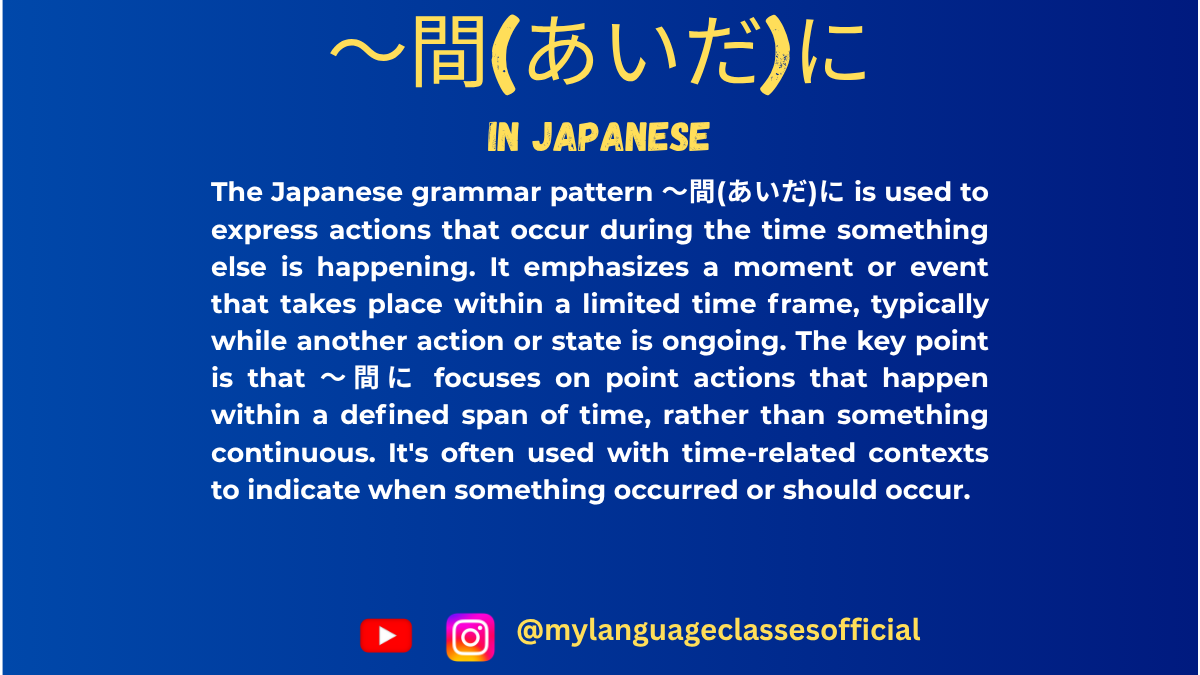Your cart is currently empty!
Tag: N1
-
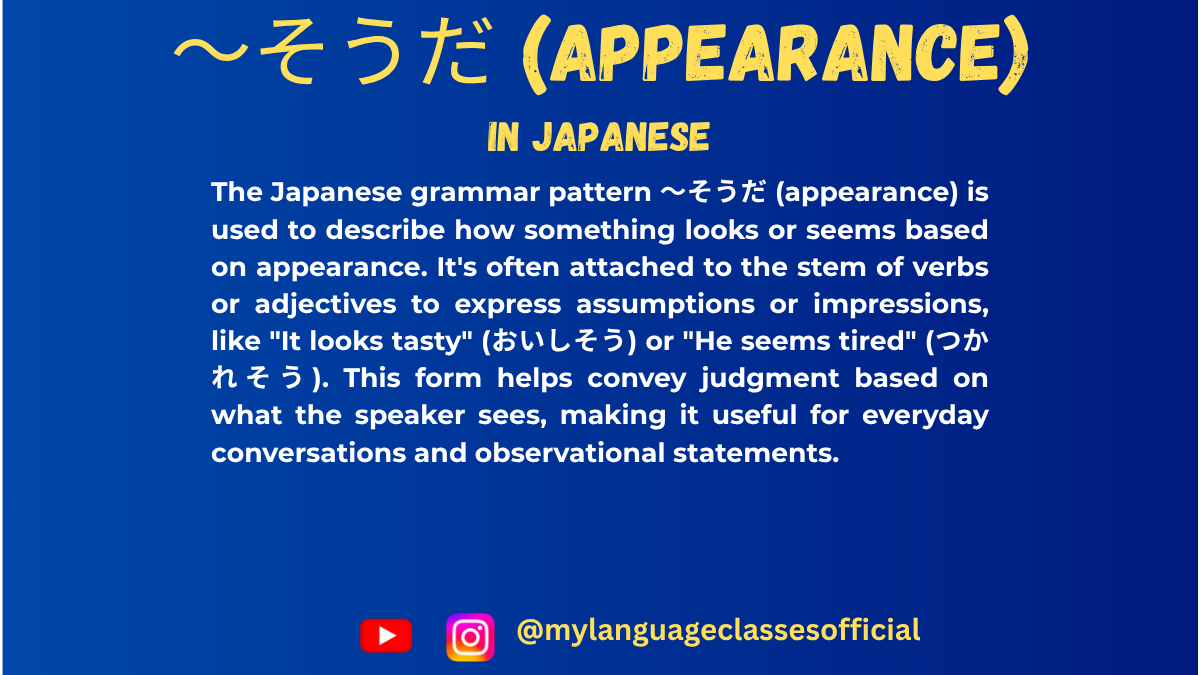
Using〜そうだ (Appearance) | My Language Classes:
Expressing ‘Looks Like’ in Japanese 〜そうだ
In Japanese, the grammar pattern 〜そうだ (sou da) is used to express that something “looks like” or “seems” a certain way based on its appearance. This pattern is useful when describing objects, actions, or situations that give a certain impression. It is often used with adjectives, nouns, and verbs, but its meaning slightly changes depending on the word category.
This blog will guide you through the formation, usage, and different contexts where 〜そうだ (Appearance) can be applied.
Formation of 〜そうだ (Appearance)
1. Using with Adjectives
- For i-adjectives: Drop the final い (i) and add 〜そうだ.
- Example: おいしい → おいしそうだ (Oishii → Oishisou da) – “Looks delicious.”
- For na-adjectives: Just add 〜そうだ directly to the adjective.
- Example: 美しい → 美しそうだ (Utsukushii → Utsukushisou da) – “Looks beautiful.”
2. Using with Verbs
- For verbs (stem form): Take the ます-stem and add 〜そうだ.
- Example: 雨が降る (Ame ga furu) → 雨が降りそうだ (Ame ga furisou da) – “It looks like it will rain.”
3. Using with Nouns
- Nouns do not usually take the 〜そうだ form when expressing appearance. Instead, のようだ or みたいだ is commonly used.
Usage of 〜そうだ (Appearance) Form
1. Describing Physical Appearance:
「他は強そうだ」
- Romaji: Kare wa tsuyosou da.
- English: He looks strong.
「このかばんは重そうだ」
- Romaji: Kono kaban wa omosou da.
- English: This bag looks heavy.
2. Expressing Predictions Based on Appearance:
「このケーキは生でたべられそうだ」
- Romaji: Kono kēki wa nama de taberare-sou da.
- English: This cake looks edible raw.
「この車はまだ動きそうだ」
- Romaji: Kono kuruma wa mada ugoki-sou da.
- English: This car looks like it can still run.
3. Talking About Immediate Future Actions:
「雨が降りそうだ」
- Romaji: Ame ga furi-sou da.
- English: It looks like it’s going to rain.
「電車が出発しそうだ」
- Romaji: Densha ga shuppatsu shisou da.
- English: The train looks like it’s about to depart.
Common Words with 〜そうだ (Appearance) Form:
Here’s a well-structured table with verbs, nouns, and adjectives in their 〜そうだ (Appearance) Form, along with two example sentences for each.
Type Word 〜そうだ Form Example Sentence 1 Romaji English Meaning Example Sentence 2 Romaji English Meaning Verb 食べる (taberu) – to eat 食べられそうだ (taberare-sou da) このケーキは美味しそうだから食べられそうだ。 Kono kēki wa oishisou dakara taberare-sou da. This cake looks delicious, so it seems edible. このスープは熱そうだけど飲めそうだ。 Kono sūpu wa atsusou dakedo nome-sou da. This soup looks hot, but it seems drinkable. Verb 壊れる (kowareru) – to break 壊れそうだ (koware-sou da) この椅子は古くて壊れそうだ。 Kono isu wa furukute koware-sou da. This chair looks old and about to break. このおもちゃは落としたら壊れそうだ。 Kono omocha wa otoshitara koware-sou da. This toy looks like it will break if dropped. Noun 雨 (ame) – rain 雨が降りそうだ (ame ga furi-sou da) 空が暗くなってきたから、雨が降りそうだ。 Sora ga kuraku natte kita kara, ame ga furi-sou da. The sky is getting dark, so it looks like it’s going to rain. 風が強くなってきたし、雨が降りそうだね。 Kaze ga tsuyoku natte kita shi, ame ga furi-sou da ne. The wind is getting stronger, and it looks like it will rain. Noun 試験 (shiken) – exam 試験が難しそうだ (shiken ga muzukashisou da) 明日の試験は難しそうだ。 Ashita no shiken wa muzukashisou da. Tomorrow’s exam looks difficult. 先生の説明を聞いて、試験が簡単そうだと思った。 Sensei no setsumei o kiite, shiken ga kantansou da to omotta. After hearing the teacher’s explanation, I thought the exam looked easy. Adjective 美味しい (oishii) – delicious 美味しそうだ (oishisou da) このラーメンは美味しそうだね! Kono rāmen wa oishisou da ne! This ramen looks delicious! おばあちゃんの作ったケーキは美味しそうだ。 Obaachan no tsukutta kēki wa oishisou da. The cake my grandmother made looks delicious. Adjective 楽しい (tanoshii) – fun 楽しそうだ (tanoshisou da) 彼らの旅行はとても楽しそうだ。 Karera no ryokō wa totemo tanoshisou da. Their trip looks really fun. あの子たちはゲームをしていて楽しそうだね。 Ano kotachi wa gēmu o shiteite tanoshisou da ne. Those kids look like they’re having fun playing games. Adjective 寒い (samui) – cold 寒そうだ (samusou da) 彼は薄い服を着ていて寒そうだ。 Kare wa usui fuku o kiteite samusou da. He is wearing thin clothes and looks cold. 外は雪が降っていてとても寒そうだ。 Soto wa yuki ga futteite totemo samusou da. It is snowing outside, and it looks very cold.
More Example Sentences
Here are 10 more example sentences using 〜そうだ (Appearance) Form, along with romaji and English meanings:
- このスープは熱そうだ。
- Romaji: Kono sūpu wa atsusou da.
- English: This soup looks hot.
- 彼は疲れていそうだ。
- Romaji: Kare wa tsukareteisou da.
- English: He looks tired.
- あの建物は古くて壊れそうだ。
- Romaji: Ano tatemono wa furukute kowaresou da.
- English: That building looks old and about to collapse.
- この箱は軽そうだね。
- Romaji: Kono hako wa karusou da ne.
- English: This box looks light.
- 彼の話は面白そうだ。
- Romaji: Kare no hanashi wa omoshirosou da.
- English: His story sounds interesting.
- この靴は履きやすそうだ。
- Romaji: Kono kutsu wa haki-yasusou da.
- English: These shoes look easy to wear.
- あの犬はおとなしくて優しそうだね。
- Romaji: Ano inu wa otonashikute yasashisou da ne.
- English: That dog looks calm and gentle.
- このカバンは丈夫そうだ。
- Romaji: Kono kaban wa joubusou da.
- English: This bag looks durable.
- 彼女の料理は美味しそうだ。
- Romaji: Kanojo no ryōri wa oishisou da.
- English: Her cooking looks delicious.
- あの道は滑りそうだから気をつけて!
- Romaji: Ano michi wa suberisou dakara ki o tsukete!
- English: That road looks slippery, so be careful!
Things to Keep in Mind About 〜そうだ (Appearance) Form
When using 〜そうだ (Appearance) Form, there are a few important points to remember:
1. Used for Visual Appearance or Impression
- This form is used when something looks a certain way based on visual observation or impression.
- Example:
- このケーキは甘そうだ。 (Kono kēki wa amasou da.) → This cake looks sweet. (Judging by appearance, not by tasting it.)
2. Not for First-Hand Experience
- It should not be used when you have direct experience with something (e.g., you actually ate the cake).
- Incorrect: このケーキを食べたけど甘そうだ。(Kono kēki o tabeta kedo amasou da.) ❌
- Correct: このケーキは甘い。(Kono kēki wa amai.) ✅ → This cake is sweet.
3. Different from 〜そうだ (Hearsay)
- 〜そうだ (Appearance) is different from 〜そうだ (Hearsay), which is used to report something you heard from someone else.
- Example (Appearance):
- 彼は元気そうだ。 (Kare wa genkisou da.) → He looks energetic.
- Example (Hearsay):
- 彼は元気だそうだ。 (Kare wa genki da sou da.) → I heard that he is energetic.
4. Adjective Conjugation Rules
- For い-adjectives: Remove い and add そうだ.
- Example: おいしい → おいしそうだ (oishii → oishisou da) → Looks delicious
- For な-adjectives: Just add そうだ.
- Example: 元気(げんき)→ 元気そうだ (genki → genkisou da) → Looks healthy
5. Special Case: Negative Form
- To say “doesn’t look ~,” change ない to なさそうだ.
- Example:
- 美味しくない (oishikunai) → 美味しくなさそうだ (oishikunasa sou da) → Doesn’t look delicious.
- 元気じゃない (genki janai) → 元気じゃなさそうだ (genki janasa sou da) → Doesn’t look healthy.
- Example:
6. Verb Usage: Potential & Immediate Action
- For potential actions: Use the stem of the potential form of the verb + そうだ.
- Example: この橋は渡れそうだ。(Kono hashi wa watare-sou da.) → This bridge looks crossable.
- For immediate actions: Use the stem of the dictionary form + そうだ.
- Example: 雨が降りそうだ。(Ame ga furi-sou da.) → It looks like it’s going to rain soon.
7. Special Irregular Adjectives
- いい (good) → よさそうだ (yosasou da) → Looks good.
- ない (not existing) → なさそうだ (nasasou da) → Doesn’t seem to exist.
Fill in the Blanks
Fill in the blanks with the correct 〜そうだ form of the given words.
Questions:
- このスープは _______ (熱い) ですね!気をつけて!
- 彼は昨日から寝ていないみたいで、とても _______ (疲れる)。
- あの子はとても _______ (賢い) ね!
- この橋は古くて _______ (壊れる)。
- あの店のラーメンは _______ (美味しい)。
- 今日は空が暗くて、雨が _______ (降る)。
- このかばんはとても _______ (丈夫) ですね。
- 彼女の話は _______ (面白い)。
- この靴は _______ (歩きやすい)。
- この椅子は _______ (座りにくい) から、別のを使おう。
Answers:
- 熱そうだ (atsusou da)
- 疲れていそうだ (tsukareteisou da)
- 賢そうだ (kashikoso da)
- 壊れそうだ (kowaresou da)
- 美味しそうだ (oishisou da)
- 降りそうだ (furisou da)
- 丈夫そうだ (joubusou da)
- 面白そうだ (omoshirosou da)
- 歩きやすそうだ (arukiyasusou da)
- 座りにくそうだ (suwarinikusou da)
Conclusion
Mastering 〜そうだ (Appearance) Form is a great way to express observations and predictions based on how things look. Whether describing someone’s emotions, the taste of food, or a future event, this grammar pattern helps make your Japanese sound more natural and fluent.
By understanding its conjugation rules, differences from hearsay 〜そうだ, and special cases, you can use it confidently in daily conversations. Keep practicing with real-life examples, and soon, you’ll be able to describe appearances effortlessly in Japanese!
If you found this guide helpful, feel free to explore more Japanese grammar lessons and keep improving your language skills.
If you enjoyed this lesson, be sure to check out more posts like this on my blog at My Language Classes. Don’t forget to subscribe my YouTube channel and follow me on Instagram for the latest language learning tips and lessons. Leave a comment below to share your thoughts, or ask any questions you have about nouns.
Happy learning! 😊
- For i-adjectives: Drop the final い (i) and add 〜そうだ.
-
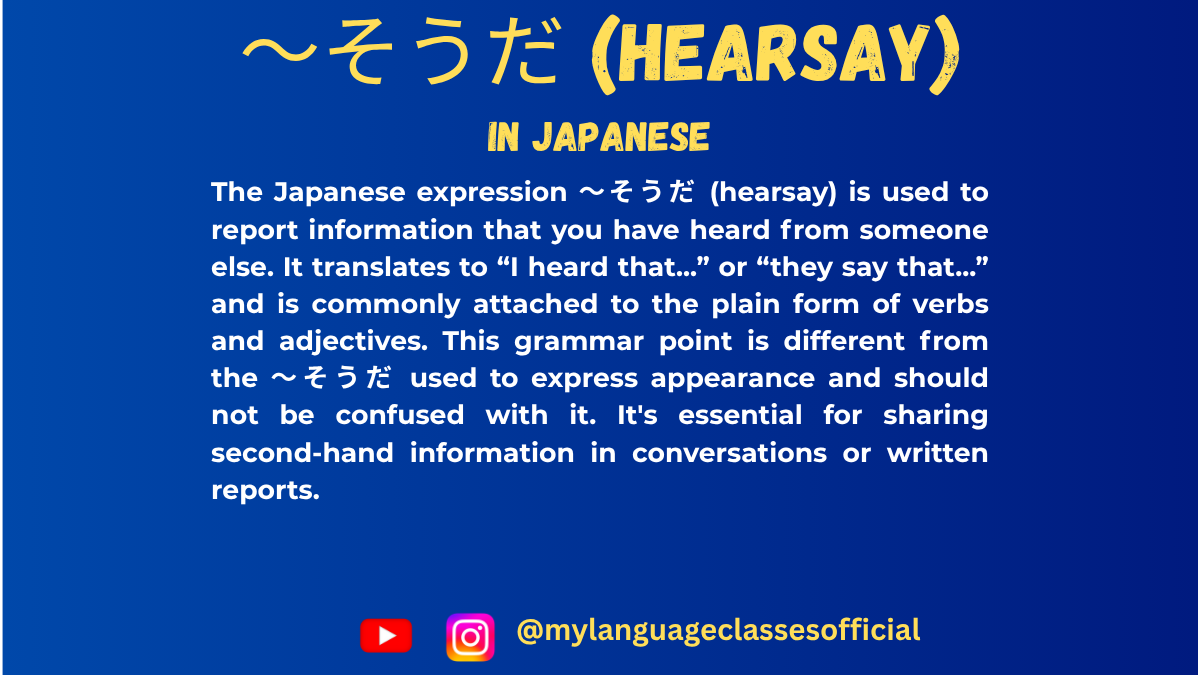
Using 〜そうだ (Hearsay) | My Language Classes
〜そうだ (Hearsay): Expressing Reported Speech in Japanese
In Japanese, the grammar structure 〜そうだ (sou da) is used to express reported speech or hearsay. This form is used when conveying information that was heard from another source, similar to “I heard that…” or “It is said that…” in English. It differs from the 〜そうだ used for expressing appearance (e.g., “It looks like…”).
Understanding how to use 〜そうだ correctly is crucial for effective communication in Japanese, as it helps relay secondhand information accurately. In this blog, we will explore the formation, usage, and differences between 〜そうだ and similar structures like 〜ようだ.
Formation of 〜そうだ (Hearsay)
1. With Verbs
To form 〜そうだ with verbs, use the plain form (dictionary form or past form) of the verb before adding そうだ.
- Verb (Plain Form) + そうだ
- Verb (Past Form) + そうだ
Example:
- 来るそうだ (kuru sou da) → “I heard that he/she will come.”
- 行ったそうだ (itta sou da) → “I heard that he/she went.”
2. With Nouns
For nouns, simply attach だそうだ after the noun.
- Noun + だそうだ
Example:
- 先生だそうだ (sensei da sou da) → “I heard that he/she is a teacher.”
3. With Adjectives
- For -i adjectives: Remove い and add そうだ
- 面白い → 面白いそうだ (omoshiroi sou da) → “I heard that it is interesting.”
- For -na adjectives: Attach だそうだ after the adjective
- 静か (shizuka) → 静かだそうだ (shizuka da sou da) → “I heard that it is quiet.”
Usage of 〜そうだ (Hearsay) in Different Situations
- News and Reports:
- 日本の人口が減っているそうだ。
- Nihon no jinkou ga hetteiru sou da.
- “I heard that Japan’s population is decreasing.”
- Casual Conversations:
- 明日、雨が降るそうだ。
- Ashita, ame ga furu sou da.
- “I heard that it will rain tomorrow.”
- Quoting Someone Else’s Words:
- 田中さんは先生になるそうだ。
- Tanaka-san wa sensei ni naru sou da.
- “I heard that Tanaka-san will become a teacher.”
Situations Where 〜ようだ is Used
Unlike 〜そうだ (Hearsay), 〜ようだ is used for conjecture or resemblance. Some common cases include:
- Guessing based on evidence
- 雨が降ったようだ。(Ame ga futta you da.) → “It seems like it rained.”
- Comparisons and similarity
- 彼は日本人のようだ。(Kare wa nihonjin no you da.) → “He seems to be Japanese.”
List of Verbs, Nouns, and Adjectives with Their 〜そうだ (Hearsay) Forms
Word Type Word (JP) Hearsay Form Example Sentence (JP) Romaji English Meaning Verb 食べる (taberu) 食べるそうだ (taberu sō da) 先生は寿司を食べるそうだ。 Sensei wa sushi o taberu sō da. The teacher is said to eat sushi. 彼は毎日ケーキを食べるそうだ。 Kare wa mainichi kēki o taberu sō da. He is said to eat cake every day. Verb 行く (iku) 行くそうだ (iku sō da) 田中さんは東京に行くそうだ。 Tanaka-san wa Tōkyō ni iku sō da. Tanaka-san is said to be going to Tokyo. 来週、彼女は海外に行くそうだ。 Raishū, kanojo wa kaigai ni iku sō da. Next week, she is said to be going abroad. Verb 勉強する (benkyō suru) 勉強するそうだ (benkyō suru sō da) 彼は毎日日本語を勉強するそうだ。 Kare wa mainichi Nihongo o benkyō suru sō da. He is said to study Japanese every day. 兄は大学で医学を勉強するそうだ。 Ani wa daigaku de igaku o benkyō suru sō da. My older brother is said to be studying medicine at university. Verb 来る (kuru) 来るそうだ (kuru sō da) 彼は明日来るそうだ。 Kare wa ashita kuru sō da. He is said to be coming tomorrow. 友達が駅に来るそうだ。 Tomodachi ga eki ni kuru sō da. My friend is said to be coming to the station. Verb 結婚する (kekkon suru) 結婚するそうだ (kekkon suru sō da) 彼女は来月結婚するそうだ。 Kanojo wa raigetsu kekkon suru sō da. She is said to be getting married next month. 田中さんは来年結婚するそうだ。 Tanaka-san wa rainen kekkon suru sō da. Tanaka-san is said to be getting married next year. Noun 先生 (sensei) 先生だそうだ (sensei da sō da) 彼の父は先生だそうだ。 Kare no chichi wa sensei da sō da. His father is said to be a teacher. 山田さんは数学の先生だそうだ。 Yamada-san wa sūgaku no sensei da sō da. Yamada-san is said to be a math teacher. Noun 有名人 (yūmeijin) 有名人だそうだ (yūmeijin da sō da) 彼は有名人だそうだ。 Kare wa yūmeijin da sō da. He is said to be a celebrity. 彼女は有名な歌手だそうだ。 Kanojo wa yūmei na kashu da sō da. She is said to be a famous singer. Noun 医者 (isha) 医者だそうだ (isha da sō da) 彼の兄は医者だそうだ。 Kare no ani wa isha da sō da. His older brother is said to be a doctor. 彼女の父は医者だそうだ。 Kanojo no chichi wa isha da sō da. Her father is said to be a doctor. Adjective (i) 高い (takai) 高いそうだ (takai sō da) このホテルは高いそうだ。 Kono hoteru wa takai sō da. This hotel is said to be expensive. あの車はとても高いそうだ。 Ano kuruma wa totemo takai sō da. That car is said to be very expensive. Adjective (i) 寒い (samui) 寒いそうだ (samui sō da) 明日は寒いそうだ。 Ashita wa samui sō da. It is said to be cold tomorrow. 北海道の冬は寒いそうだ。 Hokkaidō no fuyu wa samui sō da. The winter in Hokkaido is said to be cold. Adjective (na) 便利 (benri) 便利だそうだ (benri da sō da) このアプリは便利だそうだ。 Kono apuri wa benri da sō da. This app is said to be convenient. 東京の電車は便利だそうだ。 Tōkyō no densha wa benri da sō da. Tokyo’s trains are said to be convenient. Adjective (na) 有名 (yūmei) 有名だそうだ (yūmei da sō da) 彼の店は有名だそうだ。 Kare no mise wa yūmei da sō da. His shop is said to be famous. 彼女の家は有名だそうだ。 Kanojo no ie wa yūmei da sō da. Her house is said to be famous.
More Example Sentences
彼は明日の会議に参加しないそうだ。
Romaji: Kare wa ashita no kaigi ni sanka shinai sō da.
English: He is said not to participate in tomorrow’s meeting.彼は新しい仕事を始めるそうだ。
Romaji: Kare wa atarashii shigoto o hajimeru sō da.
English: He is said to be starting a new job.この映画はとても面白いそうだ。
Romaji: Kono eiga wa totemo omoshiroi sō da.
English: This movie is said to be very interesting.彼女の弟は医者になるそうだ。
Romaji: Kanojo no otōto wa isha ni naru sō da.
English: Her younger brother is said to become a doctor.先生は今週忙しいそうだ。
Romaji: Sensei wa konshū isogashii sō da.
English: The teacher is said to be busy this week.この店のラーメンは美味しいそうだ。
Romaji: Kono mise no rāmen wa oishii sō da.
English: The ramen from this shop is said to be delicious.あのホテルはサービスが良いそうだ。
Romaji: Ano hoteru wa sābisu ga yoi sō da.
English: That hotel is said to have good service.彼は来年アメリカに引っ越すそうだ。
Romaji: Kare wa rainen Amerika ni hikkosu sō da.
English: He is said to be moving to America next year.この会社は給料が高いそうだ。
Romaji: Kono kaisha wa kyūryō ga takai sō da.
English: This company is said to have high salaries.日本の夏はとても暑いそうだ。
Romaji: Nihon no natsu wa totemo atsui sō da.
English: The summer in Japan is said to be very hot.
Things to Keep in Mind
〜そうだ is only used when you hear information from someone else, not for personal assumptions.
〜そうだ (Hearsay) should not be confused with 〜そうだ (Appearance).
Fill in the Blanks Questions
- 田中さんは来月日本に____そうだ。
- 彼の兄は医者____そうだ。
- この本はとても面白い____そうだ。
- 先生は毎日運動を____そうだ。
- このレストランの料理は美味しい____そうだ。
- 彼は新しい車を____そうだ。
- 明日は天気が悪い____そうだ。
- 彼女は来年結婚____そうだ。
- この映画は子供に人気____そうだ。
- 友達は今日学校に来ない____そうだ。
Answers
1.そう (sō)
2.行く (iku)
3.だ (da)
4.そう (sō)
5.する (suru)
6.そう (sō)
7.買う (kau)
8.そう (sō)
9.する (suru)
10.だ (da)
Conclusion
Understanding 〜そうだ (Hearsay) is essential for conveying reported information in Japanese. By practicing its correct usage with verbs, adjectives, and nouns, learners can improve their fluency and comprehension. Keep practicing, and soon this grammar pattern will become second nature!
If you enjoyed this lesson, be sure to check out more posts like this on my blog at My Language Classes. Don’t forget to subscribe my YouTube channel and follow me on Instagram for the latest language learning tips and lessons. Leave a comment below to share your thoughts, or ask any questions you have about nouns.
Happy learning! 😊
-
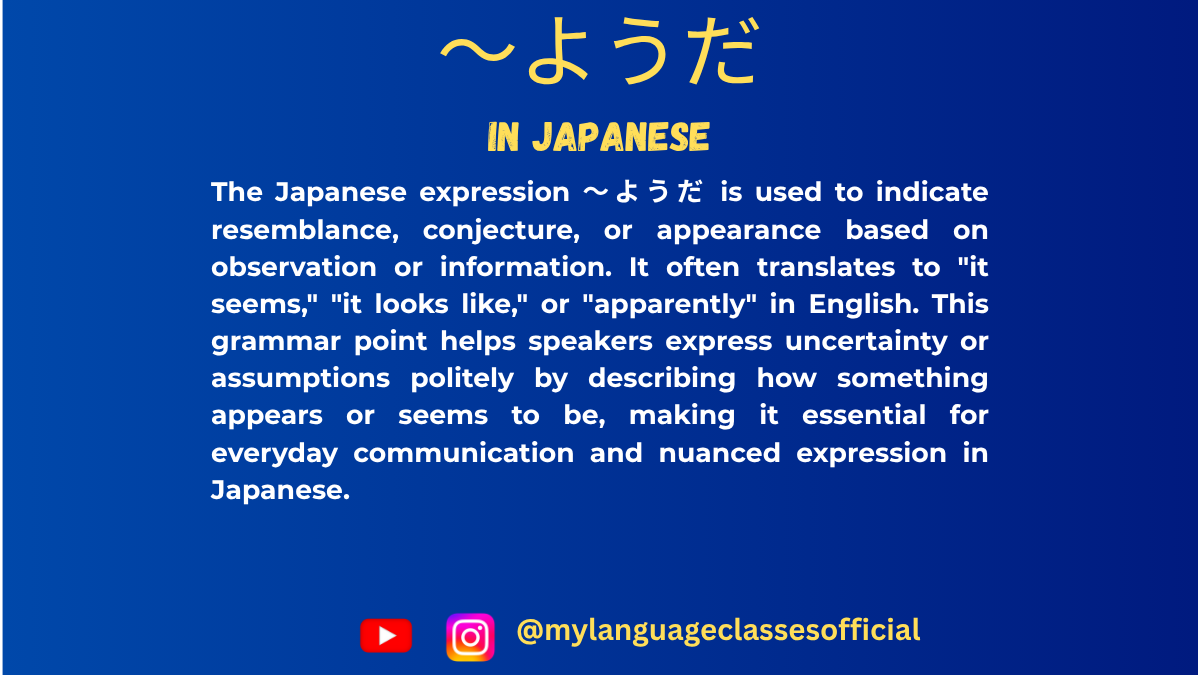
Understanding 〜ようだ in Japanese | My Language Classes
Understanding 〜ようだ in Japanese
The Japanese expression 〜ようだ (you da) is used to indicate resemblance, assumption, or conjecture based on observable evidence. It often translates to “seems like,” “appears to be,” or “looks like” in English. This form is frequently used in both spoken and written Japanese to express an impression based on visual or contextual clues rather than firsthand knowledge.
Formation of 〜ようだ
1. With Verbs:
- Formation:
- Verb (dictionary form) + ようだ
- Verb (ta-form) + ようだ (past tense)
2. With Nouns:
- Formation:
- Noun + のようだ
3. With Adjectives:
- i-Adjectives:
- Adjective (plain form) + ようだ
- na-Adjectives:
- Adjective (stem) + なようだ
Usage of 〜ようだ
- Expressing Appearance – Used when something visually appears a certain way.
- Expressing Similarity – Used to compare something to another thing.
- Expressing Assumption – Used to make an educated guess based on observed facts.
- Expressing Uncertainty – Used to indicate something that is not confirmed.
Situations where 〜ようだ is used
- When making an assumption based on visual clues.
- When describing a person’s behavior resembling something.
- When comparing one thing to another.
- When describing a feeling or state that is not directly observable.
- When indicating a metaphorical expression.
Examples of Verbs, Nouns, and Adjectives with 〜ようだ
Word Type Base Word 〜ようだ Form Example Sentence Romaji Meaning Verb 食べる (taberu) 食べるようだ あの子はよく食べるようだ。 Ano ko wa yoku taberu you da. That child seems to eat a lot. Verb 雨が降る (ame ga furu) 雨が降るようだ 突然暑くなったから雨が降るようだ。 Totsuzen atsuku natta kara ame ga furu you da. It suddenly got hot, so it looks like it’s going to rain. Verb 走る (hashiru) 走るようだ 子供が快速に走るようだ。 Kodomo ga kaisoku ni hashiru you da. The child seems to be running fast. Noun 神様 (kami-sama) 神様のようだ 他の行動は神様のようだ。 Kare no koudou wa kami-sama no you da. His actions are like those of a god. Adjective 青い (aoi) 青いようだ 水が青いようだ。 Mizu ga aoi you da. The water seems to be blue.
More Example Sentences
- 他の思い通りのようだ。
Tano omoi doori no you da. (It seems to be just as he thought.) - 子供はおなかがすいたようだ。
Kodomo wa onaka ga suita you da. (The child seems to be hungry.) - 家の外は非常に冷たいようだ。
Ie no soto wa hijou ni tsumetai you da. (It seems to be extremely cold outside.)
Things to Keep in Mind
- 〜ようだ is different from 〜そうだ, which is used for hearsay or direct appearance.
- It cannot be used for one’s own direct experiences.
- 〜ようだ can be formal or casual depending on context.
Fill in the Blanks
- 大きな壁が倒れる\u_____
- その人はエンジニア\uの\u_____
- 雨が降りそう\u_____
- 私の猫は子猫の\u_____
- その子は疲れている\u_____
- その風は強い\u_____
- かれの勝利は確実の_____
Answers
- ようだ
- ようだ
- ようだ
- ようだ
- ようだ
- ようだ
- ようだ
Conclusion
〜ようだ is a crucial structure in Japanese that allows speakers to express assumptions, resemblance, and indirect knowledge. Mastering this form helps in making more natural and nuanced statements in Japanese conversations and writing.
If you enjoyed this lesson, be sure to check out more posts like this on my blog at My Language Classes. Don’t forget to subscribe my YouTube channel and follow me on Instagram for the latest language learning tips and lessons. Leave a comment below to share your thoughts, or ask any questions you have about nouns.
Happy learning! 😊
- Formation:
-
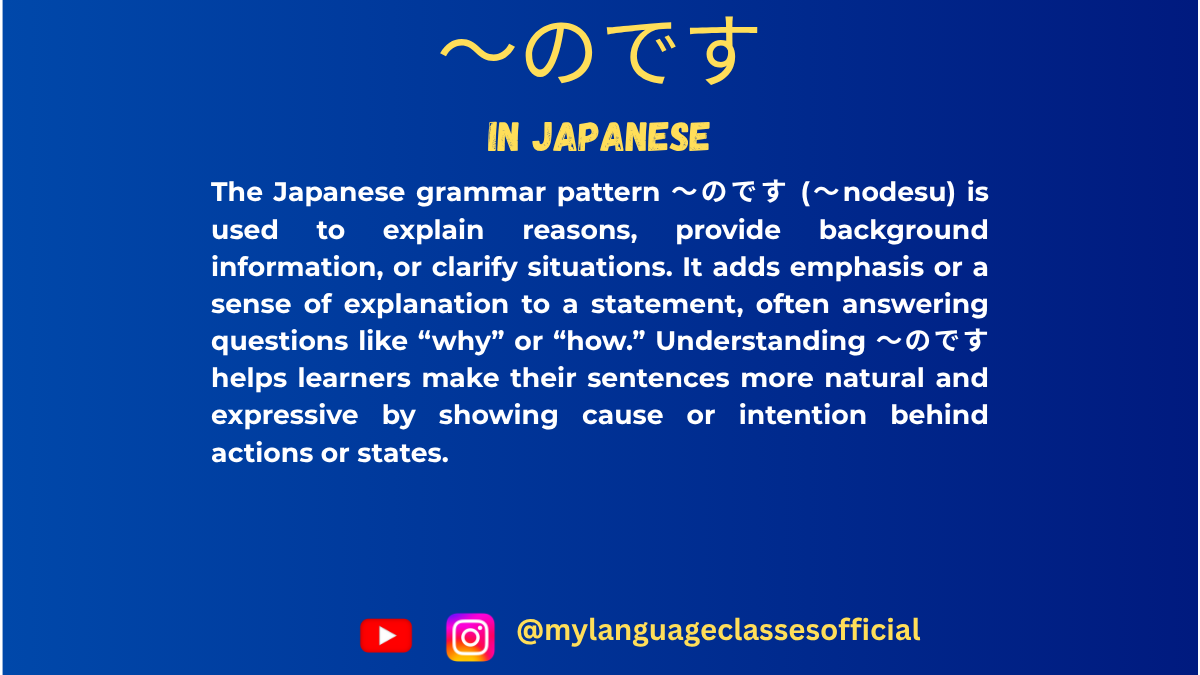
Understanding 〜のですin Japanese | My Language Classes
Understanding 〜のです in Japanese
The 〜のです (or its casual form 〜んです) is a grammatical structure in Japanese used to give explanations, seek clarifications, or express emotions. It adds a sense of reasoning to a statement and is often used in both spoken and written Japanese.
Formation of 〜のです
1. Formation with Verbs
- Affirmative (Present/Future):
- Dictionary form + のです / んです
- Example: 食べるのです (taberu no desu)
- Negative (Present/Future):
- ない-form + のです / んです
- Example: 食べないのです (tabenai no desu)
- Past Affirmative:
- た-form + のです / んです
- Example: 食べたのです (tabeta no desu)
- Past Negative:
- なかった-form + のです / んです
- Example: 食べなかったのです (tabenakatta no desu)
2. Formation with Nouns
- Affirmative:
- Noun + なのです / なんです (casual)
- Example: 学生なのです (gakusei nano desu)
- Negative:
- Noun + ではないのです / じゃないんです (casual)
- Example: 学生ではないのです (gakusei dewa nai no desu)
3. Formation with Adjectives
- i-Adjectives:
- そのまま + のです / んです
- Example: うれしいのです (ureshii no desu)
- Negative: うれしくないのです (ureshikunai no desu)
- na-Adjectives:
- な + のです / んです
- Example: 静かなのです (shizuka nano desu)
- Negative: 静かではないのです (shizuka dewa nai no desu)
Usage of 〜のです
The 〜のです form is used in various situations. Below are the key contexts in which it is used:
1. Providing an Explanation
This form is often used to explain reasons behind actions or situations.
- Example: どうして遅れたのですか? (Why were you late?)
- Example: 雨が降っていたのです。(It was raining.)
2. Seeking Clarification or Confirmation
When you are trying to confirm or seek clarification about something.
- Example: その本はあなたのものなのですか? (Is that book yours?)
3. Expressing a Justification
To justify an action or event.
- Example: 宿題が多かったのです。(I had a lot of homework.)
4. Making a Statement More Emphatic
Using のです makes the statement more formal or assertive.
- Example: 私が行くのです。(I will go.)
5. Stating a Fact with Emphasis
- Example: これはとても大切なのです。(This is very important.)
Other Usage of 〜のです
Situations where 〜のです is used
- Giving explanations or reasons
- Asking for explanations or clarifications
- Expressing emotions such as surprise or concern
- Emphasizing a statement
- Giving background information
- Making an indirect request
- Softening a statement
- Seeking confirmation
- Expressing curiosity
- Describing an unusual situation
List of Verbs with their 〜のです Form
Verb (Dictionary Form) 〜のです Form Example Sentence 1 Romaji Meaning Example Sentence 2 Romaji Meaning 食べる (taberu) 食べるのです これは毎日食べるのです。 Kore wa mainichi taberu no desu. I eat this every day. 彼は魚を食べるのですか? Kare wa sakana o taberu no desu ka? Does he eat fish? 行く (iku) 行くのです 学校へ行くのです。 Gakkou e iku no desu. I am going to school. どこへ行くのですか? Doko e iku no desu ka? Where are you going? 来る (kuru) 来るのです 明日、彼が来るのです。 Ashita, kare ga kuru no desu. He is coming tomorrow. どうして来るのですか? Doushite kuru no desu ka? Why is he coming? 見る (miru) 見るのです 彼はテレビを見るのです。 Kare wa terebi o miru no desu. He watches TV. 何を見ているのですか? Nani o mite iru no desu ka? What are you watching? 書く (kaku) 書くのです 彼女は日記を書くのです。 Kanojo wa nikki o kaku no desu. She writes a diary. 何を書いているのですか? Nani o kaite iru no desu ka? What are you writing? 話す (hanasu) 話すのです 先生は日本語を話すのです。 Sensei wa nihongo o hanasu no desu. The teacher speaks Japanese. 彼と何を話していたのですか? Kare to nani o hanashite ita no desu ka? What were you talking about with him? 買う (kau) 買うのです 私は新しい車を買うのです。 Watashi wa atarashii kuruma o kau no desu. I will buy a new car. 何を買ったのですか? Nani o katta no desu ka? What did you buy? 泳ぐ (oyogu) 泳ぐのです 彼は毎朝泳ぐのです。 Kare wa maiasa oyogu no desu. He swims every morning. どこで泳ぐのですか? Doko de oyogu no desu ka? Where do you swim? 勉強する (benkyou suru) 勉強するのです 私は毎日日本語を勉強するのです。 Watashi wa mainichi nihongo o benkyou suru no desu. I study Japanese every day. 何を勉強しているのですか? Nani o benkyou shite iru no desu ka? What are you studying? 働く (hataraku) 働くのです 彼は銀行で働くのです。 Kare wa ginkou de hataraku no desu. He works at a bank. どこで働いているのですか? Doko de hataraite iru no desu ka? Where do you work? 走る (hashiru) 走るのです 彼は毎朝公園で走るのです。 Kare wa maiasa kouen de hashiru no desu. He runs in the park every morning. どのくらい走るのですか? Dono kurai hashiru no desu ka? How far do you run? 歌う (utau) 歌うのです 彼女はとても上手に歌うのです。 Kanojo wa totemo jouzu ni utau no desu. She sings very well. どんな歌を歌うのですか? Donna uta o utau no desu ka? What kind of songs do you sing? 覚える (oboeru) 覚えるのです 私は新しい単語を覚えるのです。 Watashi wa atarashii tango o oboeru no desu. I memorize new words. どうやって覚えるのですか? Dou yatte oboeru no desu ka? How do you memorize them? 遊ぶ (asobu) 遊ぶのです 子供たちは公園で遊ぶのです。 Kodomotachi wa kouen de asobu no desu. The children play in the park. どこで遊ぶのですか? Doko de asobu no desu ka? Where do they play?
More Example Sentences
- 明日はテストがあるのです。
Ashita wa tesuto ga aru no desu.
(There is a test tomorrow.) - 彼女は病気なのです。
Kanojo wa byouki na no desu.
(She is sick.) - この本は大切なのです。
Kono hon wa taisetsu na no desu.
(This book is important.)
4. 彼は昨日学校を休んだのです。
Kare wa kinō gakkō o yasunda no desu.
(He was absent from school yesterday.)5. どうしてそんなに疲れているのですか?
Dōshite sonna ni tsukarete iru no desu ka?
(Why are you so tired?)6.この時計は祖父からもらったのです。
Kono tokei wa sofu kara moratta no desu.
(I received this watch from my grandfather.)7. 彼女は日本に行くのです。
Kanojo wa Nihon ni iku no desu.
(She is going to Japan.)8. 電車が遅れたのです。
Densha ga okureta no desu.
(The train was delayed.)9.その映画はとても感動的だったのです。
Sono eiga wa totemo kandō-teki datta no desu.
(That movie was very emotional.)10.雨が降っていたのです。
Ame ga futte ita no desu.
(It was raining.)
Things to Keep in Mind
- のです is often shortened to んです in spoken language.
- It is more polite and formal than a direct statement.
- Used in interrogative sentences to seek more information.
- Often used in written explanations and discussions.
Fill in the Blanks
- なぜ学校を休んだ____?
- 彼女は来ない____。
- 私は先生に質問した____。
- どうして泣いている____か?
- 彼は何も言わなかった____。
- あなたが怒っているのは知っている____。
- 昨日、帰りが遅くなった____。
- この本を読んだことがある____か?
- 今日は早く寝たほうがいい____よ。
- 彼がそんなことをするはずがない____。
Conclusion
The 〜のです form is an essential grammar structure that allows Japanese speakers to explain reasons, seek clarifications, and emphasize statements naturally. Mastering its usage will significantly improve your fluency in Japanese communication. Practice using のです in different situations, and you’ll soon find yourself speaking more like a native!
If you enjoyed this lesson, be sure to check out more posts like this on my blog at My Language Classes. Don’t forget to subscribe my YouTube channel and follow me on Instagram for the latest language learning tips and lessons. Leave a comment below to share your thoughts, or ask any questions you have about nouns.
Happy learning! 😊
- Affirmative (Present/Future):
-
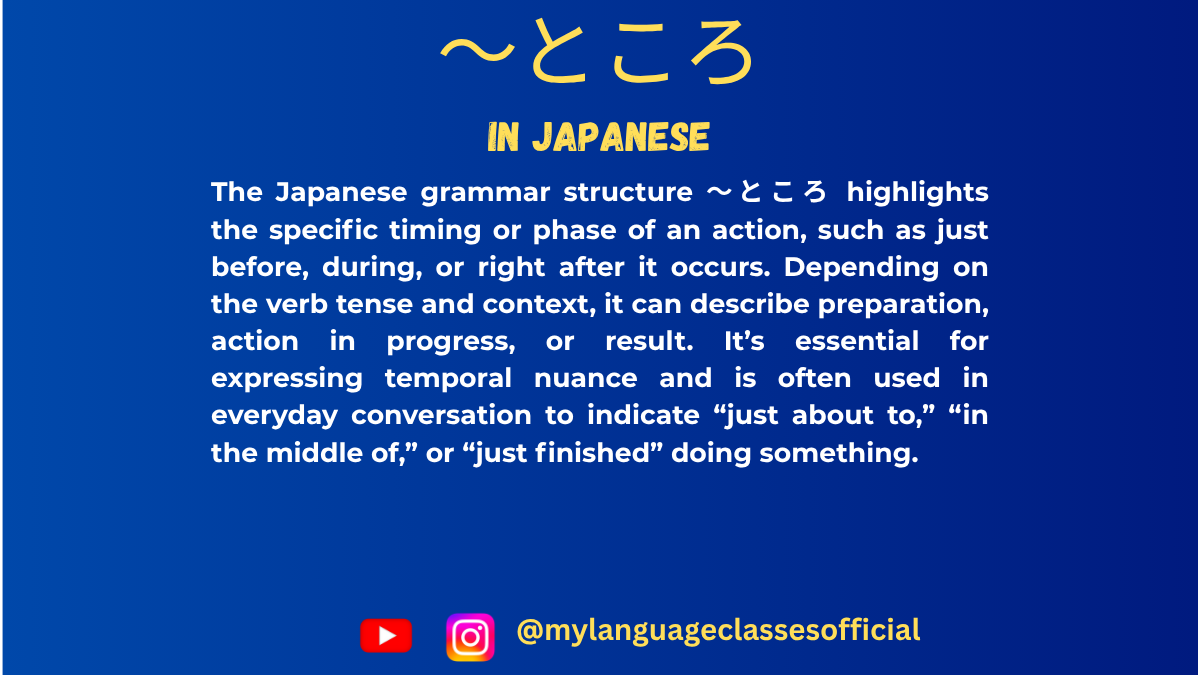
How to Use 〜ところ in Japanese | My Language Classes
Using 〜ところ Form in Japanese
The 〜ところ form is a crucial grammatical structure in Japanese that expresses different stages of an action. It helps indicate whether an action is about to happen, is in progress, or has just been completed. This blog post will cover the formation of 〜ところ for all three verb groups, its various uses, and provide example sentences, things to keep in mind, exercises, and a conclusion.
Formation of 〜ところ Form
Group 1 (Ichidan Verbs)
For ichidan (一段) verbs, remove る from the dictionary form and add the appropriate auxiliary:
- Before the action: 〜るところ
- During the action: 〜ているところ
- After the action: 〜たところ
Example:
- 食べる (taberu – to eat)
- Before: 食べるところ (taberu tokoro)
- During: 食べているところ (tabete iru tokoro)
- After: 食べたところ (tabeta tokoro)
Group 2 (Godan Verbs)
For godan (五段) verbs, use the same rules as ichidan verbs but conjugate accordingly:
- Before the action: Dictionary form + ところ
- During the action: て-form + いるところ
- After the action: た-form + ところ
Example:
- 読む (yomu – to read)
- Before: 読むところ (yomu tokoro)
- During: 読んでいるところ (yonde iru tokoro)
- After: 読んだところ (yonda tokoro)
Group 3 (Irregular Verbs)
For irregular verbs like する and くる:
- する (suru – to do)
- Before: するところ (suru tokoro)
- During: しているところ (shite iru tokoro)
- After: したところ (shita tokoro)
- くる (kuru – to come)
- Before: くるところ (kuru tokoro)
- During: きているところ (kite iru tokoro)
- After: きたところ (kita tokoro)
Usage of 〜ところ
Situations where 〜ところ is used:
Situation Form Used Example Right before an action るところ 今から寝るところです。 (I’m just about to sleep.) In the middle of an action ているところ ちょうど宿題をしているところです。 (I am in the middle of doing my homework.) Just after an action たところ ちょうどご飯を食べたところです。 (I just finished eating.) To indicate an important moment る・ている・たところ 試験を受けるところだった。(I was just about to take the exam.) When explaining a sequence of events たところ 先生に聞いたところ、すぐに答えがわかった。(When I asked the teacher, I immediately understood the answer.)
Example Sentences
- 電車が出発するところです。
Densha ga shuppatsu suru tokoro desu.
(The train is about to depart.) - 彼は今、電話しているところです。
Kare wa ima, denwa shite iru tokoro desu.
(He is on the phone right now.) - ちょうど昼ご飯を食べたところです。
Choudo hirugohan o tabeta tokoro desu.
(I just finished eating lunch.) - 飛行機が今にも飛ぶところです。
Hikouki ga ima ni mo tobu tokoro desu.
(The airplane is just about to take off.) - 友達と話しているところでした。
Tomodachi to hanashite iru tokoro deshita.
(I was in the middle of talking with my friend.) - 彼に聞いたところ、すぐに答えてくれました。
Kare ni kiita tokoro, sugu ni kotaete kuremashita.
(When I asked him, he answered immediately.) - ちょうど今、家を出るところです。
Choudo ima, ie o deru tokoro desu.
(I am just about to leave home.) - 映画を見ているところです。
Eiga o mite iru tokoro desu.
(I am in the middle of watching a movie.) - 買い物が終わったところです。
Kaimono ga owatta tokoro desu.
(I just finished shopping.) - 勉強するところだったのに、友達が来ました。
Benkyou suru tokoro datta noni, tomodachi ga kimashita.
(I was about to study, but my friend came.)
Things to Keep in Mind
- 〜ところ emphasizes timing rather than the state of an action.
- Be careful not to confuse たところ with たばかり; たところ emphasizes immediate completion.
- ているところ is often used to explain ongoing actions.
- This form is frequently used with words like ちょうど (exactly, just), 今 (now), まさに (precisely).
Fill in the Blanks
- ちょうど今、映画を____ところです。
- 飛行機が____ところでした。
- 彼は電話を____ところです。
- 今、家を____ところです。
- 私は宿題を____ところだった。
- 友達が来たので、ちょうど出かける____だった。
- 先生に聞いた____、すぐに理解しました。
- 彼はまだ寝る____ではありません。
- ちょうどレポートを____ところでした。
- 仕事が終わった____です。
Answers
- 見ている
- 飛ぶ
- している
- 出る
- する
- ところ
- ところ
- ところ
- 書く
- ところ
Conclusion
The 〜ところ form is an essential grammar point that helps clarify the timing of an action. Whether something is about to happen, currently happening, or has just happened, understanding how to use 〜ところ correctly will significantly improve your Japanese fluency. Keep practicing, and soon this structure will become second nature in your conversations!
If you enjoyed this lesson, be sure to check out more posts like this on my blog at My Language Classes. Don’t forget to subscribe my YouTube channel and follow me on Instagram for the latest language learning tips and lessons. Leave a comment below to share your thoughts, or ask any questions you have about nouns.
Happy learning! 😊
-
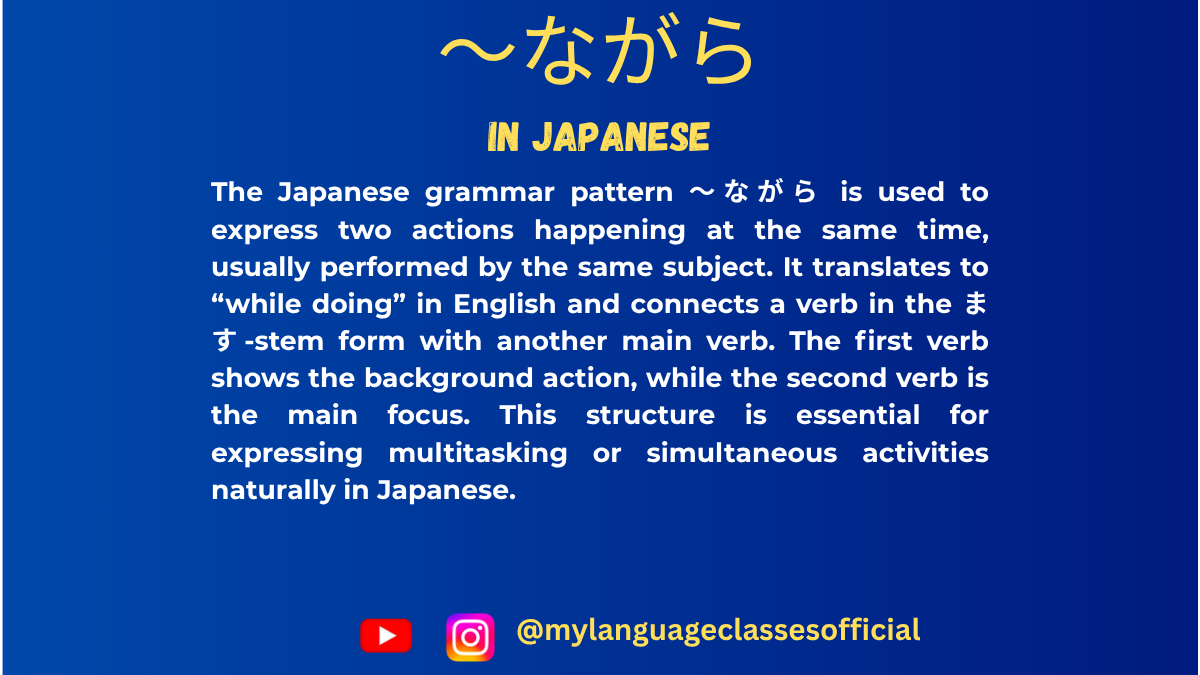
Using 〜ながら Form in Japanese | My Language Classes
〜ながら Form in Japanese
The 〜ながら (nagara) form is an essential Japanese grammar structure used to describe two actions happening simultaneously. It is widely used in both casual and formal conversations to indicate multitasking or actions occurring at the same time.
In this blog, we will explore the formation of 〜ながら for all three verb groups, its various usages, and a comprehensive list of verbs with example sentences. Additionally, we will provide a section with more example sentences, fill-in-the-blank exercises, key points to remember, and a conclusion.
Formation of 〜ながら for Different Verb Groups
Japanese verbs are categorized into three groups: Group 1 (Godan verbs), Group 2 (Ichidan verbs), and Group 3 (Irregular verbs). Each group follows a specific rule for forming 〜ながら.
1. Group 1 (Godan Verbs)
For Godan verbs, take the ます-stem of the verb and add ながら.
- Example Formation
- 話す (hanasu – to speak) → 話しながら (hanashinagara – while speaking)
- 書く (kaku – to write) → 書きながら (kakinagara – while writing)
2. Group 2 (Ichidan Verbs)
For Ichidan verbs, remove る from the dictionary form and add ながら.
- Example Formation
- 食べる (taberu – to eat) → 食べながら (tabenagara – while eating)
- 見る (miru – to see) → 見ながら (minagara – while watching)
3. Group 3 (Irregular Verbs)
There are only two irregular verbs in Japanese: する and くる.
- Example Formation
- する (suru – to do) → しながら (shiinagara – while doing)
- くる (kuru – to come) → きながら (kinagara – while coming)
Situations Where 〜ながら Form is Used
- Describing Two Simultaneous Actions
- 音楽を聞きながら勉強する (Ongaku o kikinagara benkyou suru) – Study while listening to music.
- Multitasking in Daily Life
- テレビを見ながらご飯を食べる (Terebi o minagara gohan o taberu) – Eat while watching TV.
- Speaking While Performing Another Action
- 笑いながら話す (Warainagara hanasu) – Talk while laughing.
- Contrasting Two Simultaneous Actions
- 悲しみながら笑う (Kanashiminagara warau) – Laugh while feeling sad.
- Working or Performing a Task While Doing Something Else
- 仕事をしながらコーヒーを飲む (Shigoto o shinagara koohii o nomu) – Drink coffee while working.
Verb List with 〜ながら Form and Example Sentences
Verb (Dictionary Form) 〜ながら Form Example Sentence (Japanese) Romaji English Translation 話す (hanasu) 話しながら (hanashinagara) 彼は笑いながら話しました。 Kare wa warainagara hanashimashita. He spoke while laughing. 書く (kaku) 書きながら (kakinagara) 先生は黒板に書きながら説明した。 Sensei wa kokuban ni kakinagara setsumei shita. The teacher explained while writing on the board. 読む (yomu) 読みながら (yominagara) 彼女は本を読みながら寝てしまった。 Kanojo wa hon o yominagara nete shimatta. She fell asleep while reading a book. 見る (miru) 見ながら (minagara) 子供たちはアニメを見ながら笑った。 Kodomotachi wa anime o minagara waratta. The children laughed while watching anime. 歩く (aruku) 歩きながら (arukinagara) 彼は音楽を聞きながら歩いた。 Kare wa ongaku o kikinagara aruita. He walked while listening to music. 食べる (taberu) 食べながら (tabenagara) 彼女はテレビを見ながら食べる。 Kanojo wa terebi o minagara taberu. She eats while watching TV. 泳ぐ (oyogu) 泳ぎながら (oyoginagara) 彼は海で泳ぎながら歌った。 Kare wa umi de oyoginagara utatta. He sang while swimming in the sea.
More Example Sentences
- 音楽を聞きながら勉強する。
Ongaku o kikinagara benkyou suru.
Study while listening to music. - コーヒーを飲みながらニュースを見る。
Koohii o nominagara nyuusu o miru.
Watch the news while drinking coffee. - 料理をしながらラジオを聞く。
Ryouri o shinagara rajio o kiku.
Listen to the radio while cooking. - 車を運転しながら歌う。
Kuruma o unten shinagara utau.
Sing while driving. - 宿題をしながら電話をする。
Shukudai o shinagara denwa o suru.
Talk on the phone while doing homework.
Fill in the Blanks Questions
- 本を______ながら、リラックスします。(読む)
- 音楽を______ながら、運転する。(聞く)
- 仕事を______ながら、テレビを見る。(する)
- ご飯を______ながら、友達と話す。(食べる)
- 日本語を______ながら、メモを取る。(勉強する)
Answers
- 読みながら (yominagara)
- 聞きながら (kikinagara)
- しながら (shiinagara)
- 食べながら (tabenagara)
- 勉強しながら (benkyou shinagara)
Things to Keep in Mind
- The subject of both actions must be the same.
- The ながら clause comes before the main action.
- ながら is used only for actions, not states.
Conclusion
The 〜ながら form is an important grammar structure in Japanese that allows smooth expression of simultaneous actions. By practicing with various verbs and sentences, you will become more fluent in using it naturally in conversations.
Keep practicing and incorporating 〜ながら into your daily Japanese studies!
If you enjoyed this lesson, be sure to check out more posts like this on my blog at My Language Classes. Don’t forget to subscribe my YouTube channel and follow me on Instagram for the latest language learning tips and lessons. Leave a comment below to share your thoughts, or ask any questions you have about nouns.
Happy learning! 😊
- Example Formation

